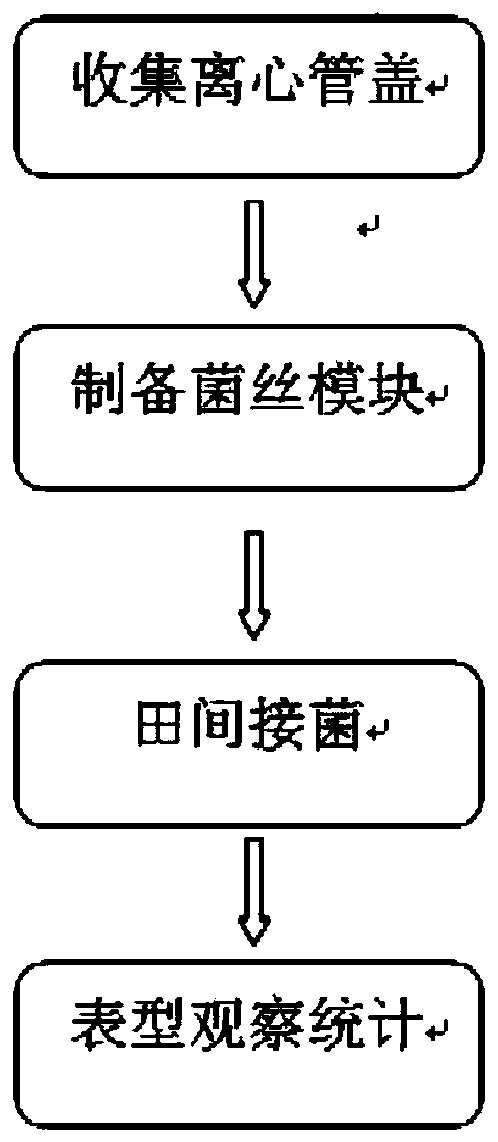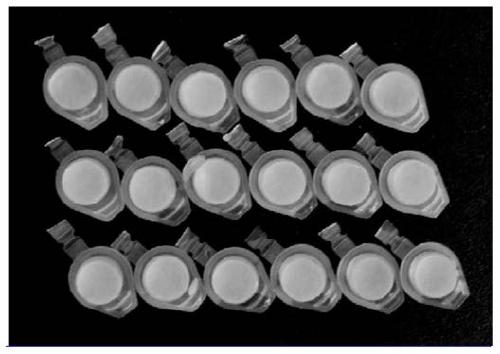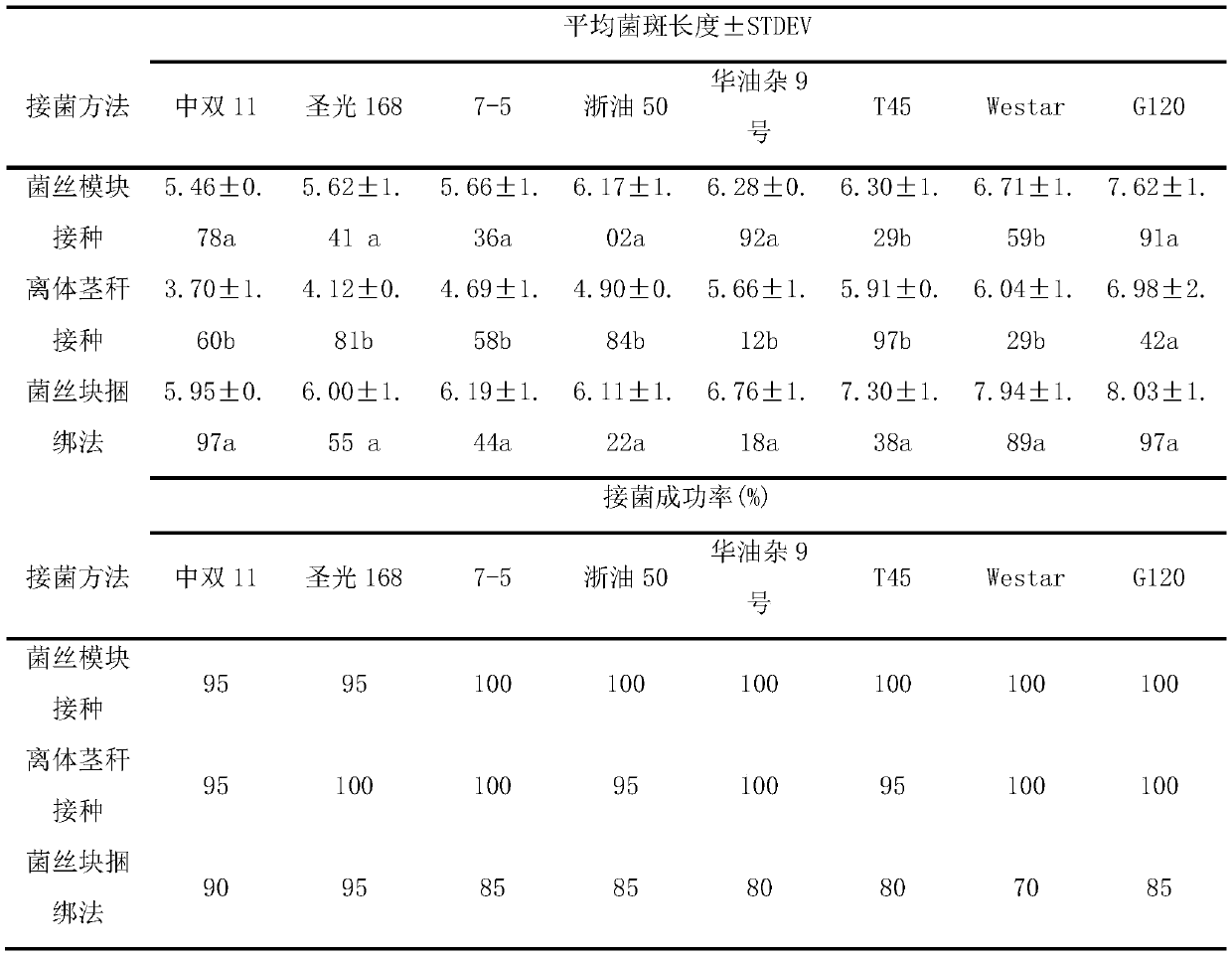Method for inoculating sclerotinite to rapeseed field stem
A technology of sclerotinia and stalks, which is applied in the field of sclerotinia sclerotiorum inoculation in rapeseed fields, can solve the problems of plant damage, investigation, and unstable identification results, so as to ensure humidity and integrity, increase the success rate of inoculation, The effect of facilitating vaccination identification
- Summary
- Abstract
- Description
- Claims
- Application Information
AI Technical Summary
Problems solved by technology
Method used
Image
Examples
Embodiment 1
[0028] 1) Collect the caps of centrifuge tubes used for other experiments
[0029] Collect the discarded 1.5mL or 2.0mL centrifuge tubes generated in the laboratory for configuring PCR, DNA extraction, etc., cut off the cover of the entire centrifuge tube with scissors, wash off the surface impurities, and then soak in 84 for 1 hour and then rinse. Allow to dry fully.
[0030] 2) Preparation of PDA medium
[0031] Buy fresh potatoes, peel and remove the buds, weigh 200g of potatoes, cut them into pieces, add 1000mL ddH2O to boil on high heat, then boil on low heat for 30min, then filter the filtrate with two layers of wet gauze and add ddH2O to 900mL. Then add 20g of agar (not added when preparing liquid medium), 20g of glucose, stir well to make it dissolve, and then set the volume to 1000mL. The thickness is not less than 5mm.
[0032] 3) Cultivation and activation of Sclerotinia
[0033] Take out the preserved Sclerotinia strains from the refrigerator at 4°C, use a punc...
Embodiment 2
[0039] 1. Preparation of PDA medium
[0040] Buy fresh potatoes, peel and remove the buds, weigh 200g of potatoes, cut them into pieces, add 1000mL ddH2O to boil on high heat, then boil on low heat for 30min, then filter the filtrate with two layers of wet gauze and add ddH2O to 900mL. Then add 20g of agar (not added when preparing liquid medium), 20g of glucose, stir well to make it dissolve, and then set the volume to 1000mL. The thickness is not less than 5mm.
[0041] 2. Cultivation and activation of Sclerotinia
[0042] Take out the preserved Sclerotinia strains from the refrigerator at 4°C, use a puncher to take out a culture medium containing mycelium blocks with a diameter of 5mm, place it on the prepared PDA medium plate, seal the culture dish and turn it upside down to prevent The water vapor in the medium affects the germination of mycelium. Culture in dark light at 22°C until the mycelium grows to the edge of the petri dish. Take the vigorously growing mycelium o...
Embodiment 3
[0046] a. Preparation of PDA medium
[0047] Buy fresh potatoes, peel and remove the buds, weigh 200g of potatoes, cut them into pieces, add 1000mL ddH2O to boil on high heat, then boil on low heat for 30min, then filter the filtrate with two layers of wet gauze and add ddH2O to 900mL. Then add 20g of agar (not added when preparing liquid medium), 20g of glucose, stir well to make it dissolve, and then set the volume to 1000mL. The thickness is not less than 5mm.
[0048] b. Cultivation and activation of Sclerotinia
[0049] Take out the preserved Sclerotinia strains from the refrigerator at 4°C, use a puncher to take out a culture medium containing mycelium blocks with a diameter of 5mm, place it on the prepared PDA medium plate, seal the culture dish and turn it upside down to prevent The water vapor in the medium affects the germination of mycelium. Culture in dark light at 22°C until the mycelium grows to the edge of the petri dish. Take the vigorously growing mycelium o...
PUM
| Property | Measurement | Unit |
|---|---|---|
| diameter | aaaaa | aaaaa |
Abstract
Description
Claims
Application Information
 Login to View More
Login to View More - R&D
- Intellectual Property
- Life Sciences
- Materials
- Tech Scout
- Unparalleled Data Quality
- Higher Quality Content
- 60% Fewer Hallucinations
Browse by: Latest US Patents, China's latest patents, Technical Efficacy Thesaurus, Application Domain, Technology Topic, Popular Technical Reports.
© 2025 PatSnap. All rights reserved.Legal|Privacy policy|Modern Slavery Act Transparency Statement|Sitemap|About US| Contact US: help@patsnap.com



